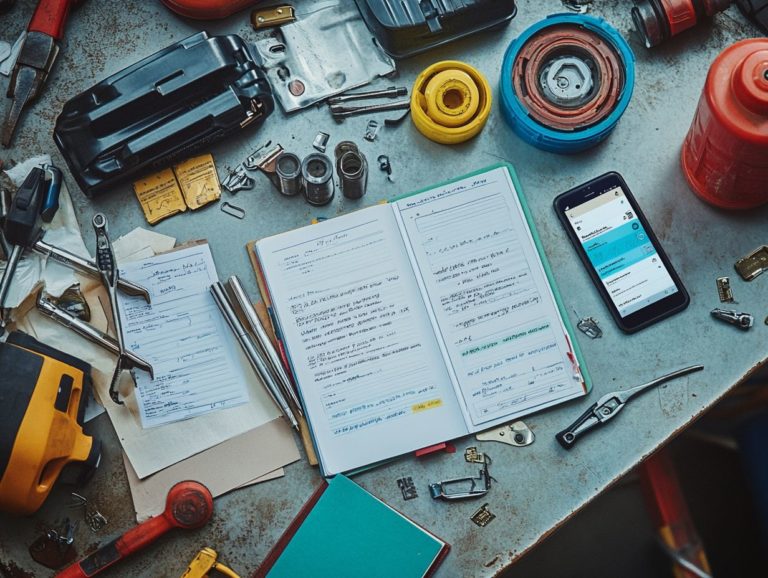How to Inspect Your Brake Fluid Levels
Brake fluid plays a crucial role in your vehicle’s braking system, yet it often slips under the radar until something goes awry.
Understanding what brake fluid is and why it s essential to maintain its levels can spare you from potentially perilous situations. This guide shows you why regular brake fluid inspections are vital for your safety. You ll also discover the proper techniques for refilling or replacing brake fluid, accompanied by valuable tips for ongoing maintenance. By ensuring your brake fluid is always in optimal condition, you keep your vehicle safe and responsive on the road.
Contents
- Key Takeaways:
- Understanding Brake Fluid
- Importance of Regularly Inspecting Brake Fluid Levels
- How to Check Brake Fluid Levels
- Signs of Low Brake Fluid Levels
- Refilling and Replacing Brake Fluid
- Tips for Maintaining Optimal Brake Fluid Levels
- Frequently Asked Questions
- What is brake fluid and why is it important to inspect its levels?
- How often should I check my brake fluid levels?
- What do I need to inspect my brake fluid levels?
- How do I check my brake fluid levels?
- What type of brake fluid should I use?
- Can I add brake fluid myself or do I need to take my car to a mechanic?
Key Takeaways:
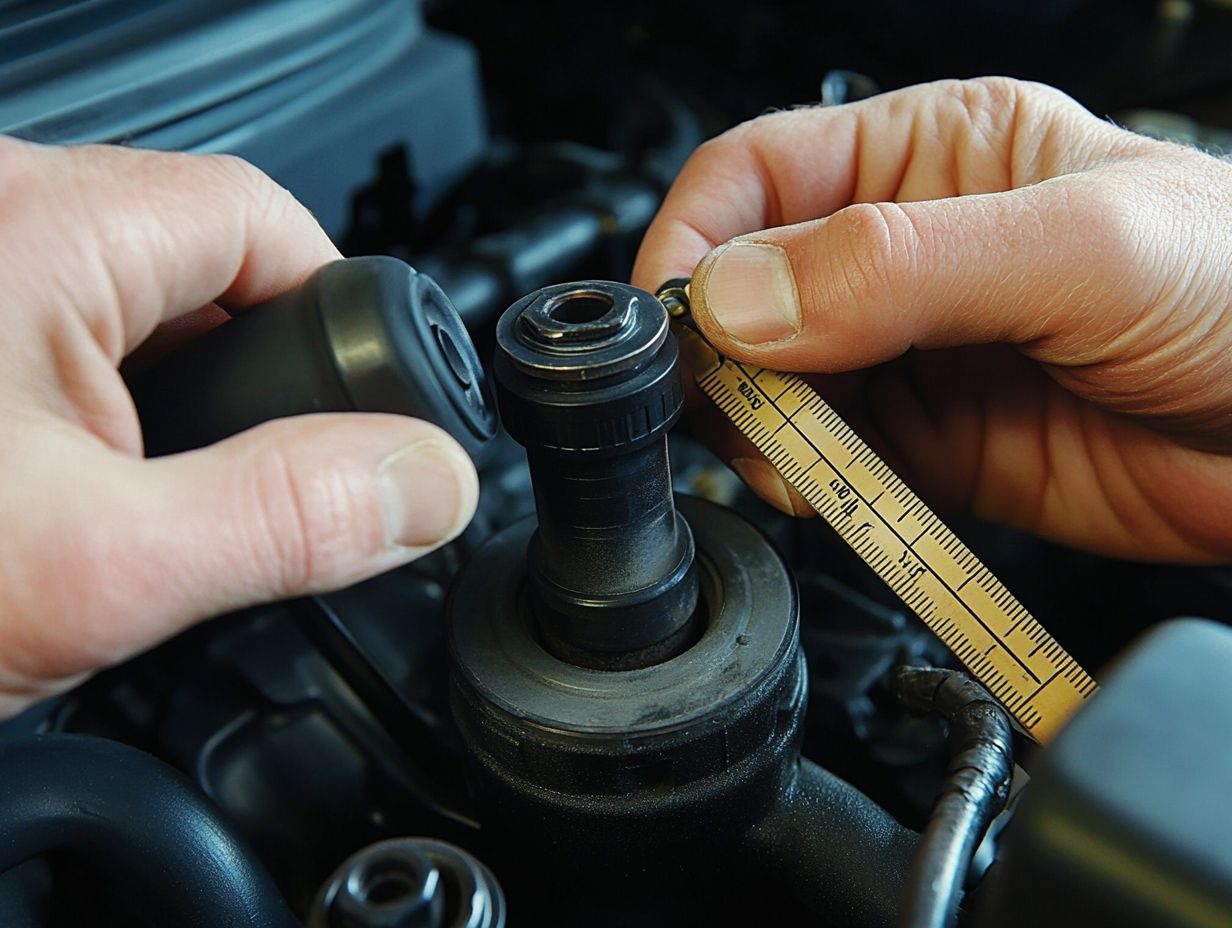
- Regularly inspecting brake fluid levels is crucial for vehicle maintenance to ensure proper braking performance and prevent potential issues.
- You can easily check your brake fluid levels at home with proper guidance, using the right techniques and products.
- Maintaining optimal brake fluid levels can be achieved through preventive maintenance tips such as checking for leaks and using the correct type of fluid.
Understanding Brake Fluid
Understanding brake fluid is crucial for maintaining the optimal performance of your vehicle s brake system, which is a vital element of automotive safety and maintenance. Brake fluid serves as a hydraulic medium a liquid that helps transfer pressure transferring force from the brake pedal to the brake pads, enabling you to stop effectively.
It resides in the brake fluid reservoir, which is linked to the master cylinder. It s imperative that it meets specific DOT specifications such as DOT 3, DOT 4, or DOT 5 to ensure reliable functionality.
What is Brake Fluid?
Brake fluid is a specialized hydraulic fluid that plays a critical role in hydraulic brake systems, ensuring optimal brake performance and safety in your vehicle. Operating on the principles of hydraulics, this fluid ensures that the force you apply to the brake pedal is transmitted smoothly and effectively to the brake components, allowing for efficient stopping power.
Typically composed of glycol ethers along with various additives that enhance its performance and stability, brake fluid is distinct due to its hygroscopic nature. This means it absorbs moisture from the air over time, leading to a lower boiling point.
It’s essential for you to maintain the appropriate boiling point to prevent brake fade in high-temperature situations, thus preserving overall braking efficiency and ensuring the safety of your vehicle.
Importance of Regularly Inspecting Brake Fluid Levels
Regularly inspecting your brake fluid levels is essential for maintaining the integrity of your vehicle’s braking system and ensuring safe driving conditions. The levels of brake fluid can reveal critical issues like leaks or contamination, both of which can significantly compromise braking efficiency.
By conducting routine inspections of your brake fluid, you engage in a crucial aspect of automotive maintenance that helps you identify potential problems early, ultimately preventing further complications within your brake system.
Why It’s Crucial for Vehicle Maintenance
Understanding the importance of maintaining proper brake fluid levels is essential for effective vehicle maintenance and your overall safety on the road. When you overlook this crucial aspect of your vehicle’s upkeep, you expose yourself to severe brake system complications that could jeopardize both performance and safety.
Insufficient or contaminated brake fluid can lead to reduced braking power, resulting in longer stopping distances and a heightened risk of accidents. Ignoring brake fluid issues may even trigger the brake warning light, indicating that immediate attention is needed.
Don t wait for trouble! To tackle these concerns, seek the expertise of an automotive specialist. They can accurately diagnose the issue and ensure your brake system operates correctly, protecting both you and other road users.
How to Check Brake Fluid Levels
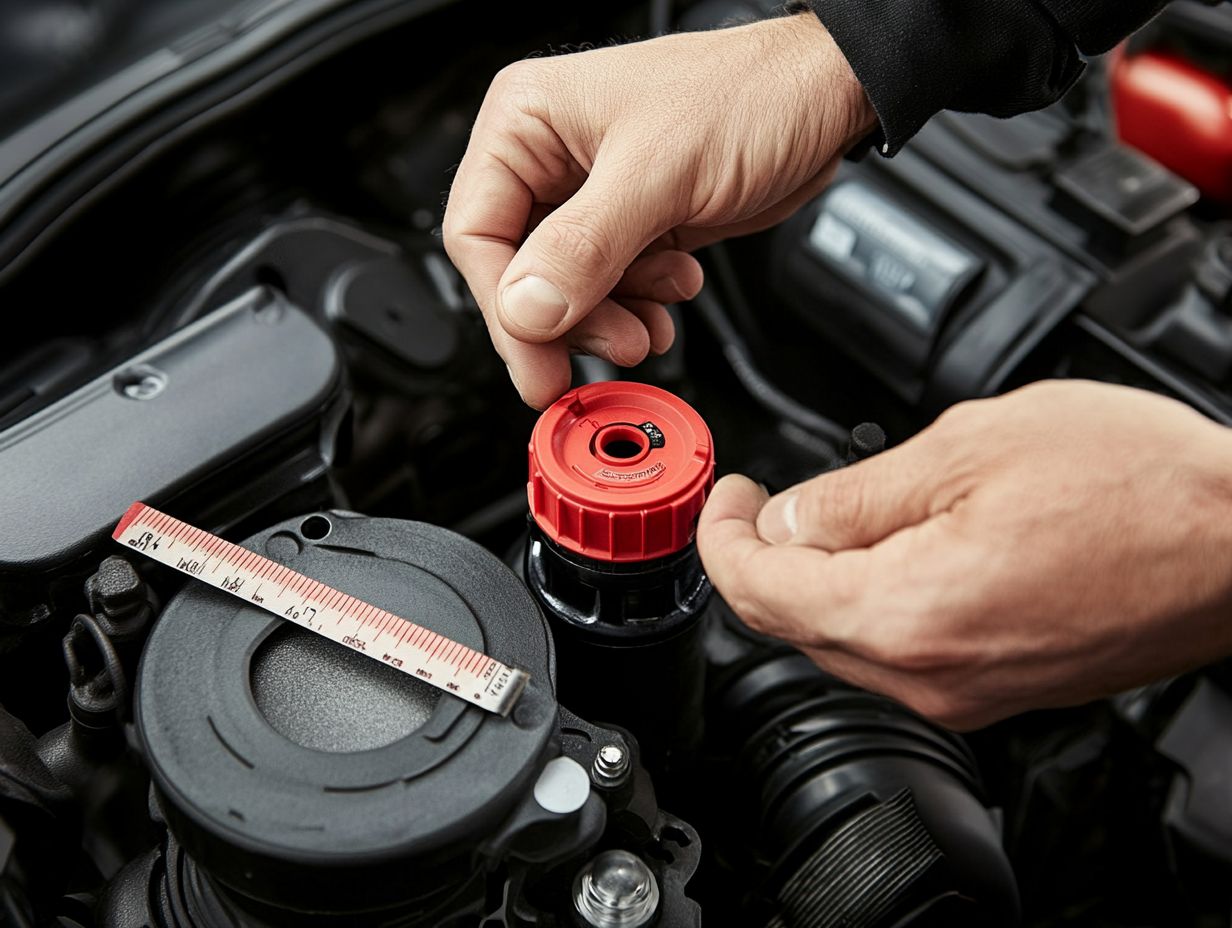
Checking your brake fluid levels is simple. It s crucial for keeping your brake system working safely.
Start by locating the brake fluid reservoir, usually near the master cylinder. Regular inspections are vital to keep your brake fluid levels optimal.
Step-by-Step Guide
To check your brake fluid levels, follow this straightforward guide to brake fluid maintenance to ensure accurate assessment and upkeep.
Begin by locating the brake fluid reservoir, typically tucked away near the back of the engine bay. Grab a flashlight to inspect the fluid s color and clarity.
Healthy brake fluid should be clear or slightly amber. If it looks dark or murky, that s a red flag for contamination. Consider using a brake fluid testing tool to quickly determine moisture levels and fluid quality.
By incorporating these steps into your vehicle maintenance routine, you can proactively tackle potential brake issues. This enhances your safety and performance on the road.
Signs of Low Brake Fluid Levels
Recognizing the signs of low brake fluid levels is crucial for maintaining optimal brake performance. Symptoms like a spongy brake pedal or an illuminated brake warning light can indicate issues.
A noticeable drop in braking efficiency may signal potential problems, including brake fluid leaks or excessive wear on brake pads. Addressing these signs promptly can prevent further damage and safeguard your peace of mind.
Identifying Potential Issues
Identifying potential issues related to low brake fluid levels is essential for effective brake maintenance. Low levels may arise from leaks or contamination.
You should regularly inspect your brake fluid to avoid serious complications. These include diminished braking power or, in the worst case, a complete failure of the braking system.
If you notice an unusual drop in fluid levels, investigate the brake lines, master cylinder, and wheel cylinders for leaks. Keeping your brake fluid clean is key to better performance and safety.
Refilling and Replacing Brake Fluid
Refilling and replacing brake fluid isn t just a chore; it s vital for your vehicle s safety and efficiency! When you notice low fluid levels or contamination, performing a brake fluid change becomes essential.
This involves carefully refilling the brake fluid reservoir with the correct type of brake fluid that meets necessary Department of Transportation (DOT) specifications. Doing this ensures safe and effective braking performance.
Proper Techniques and Products
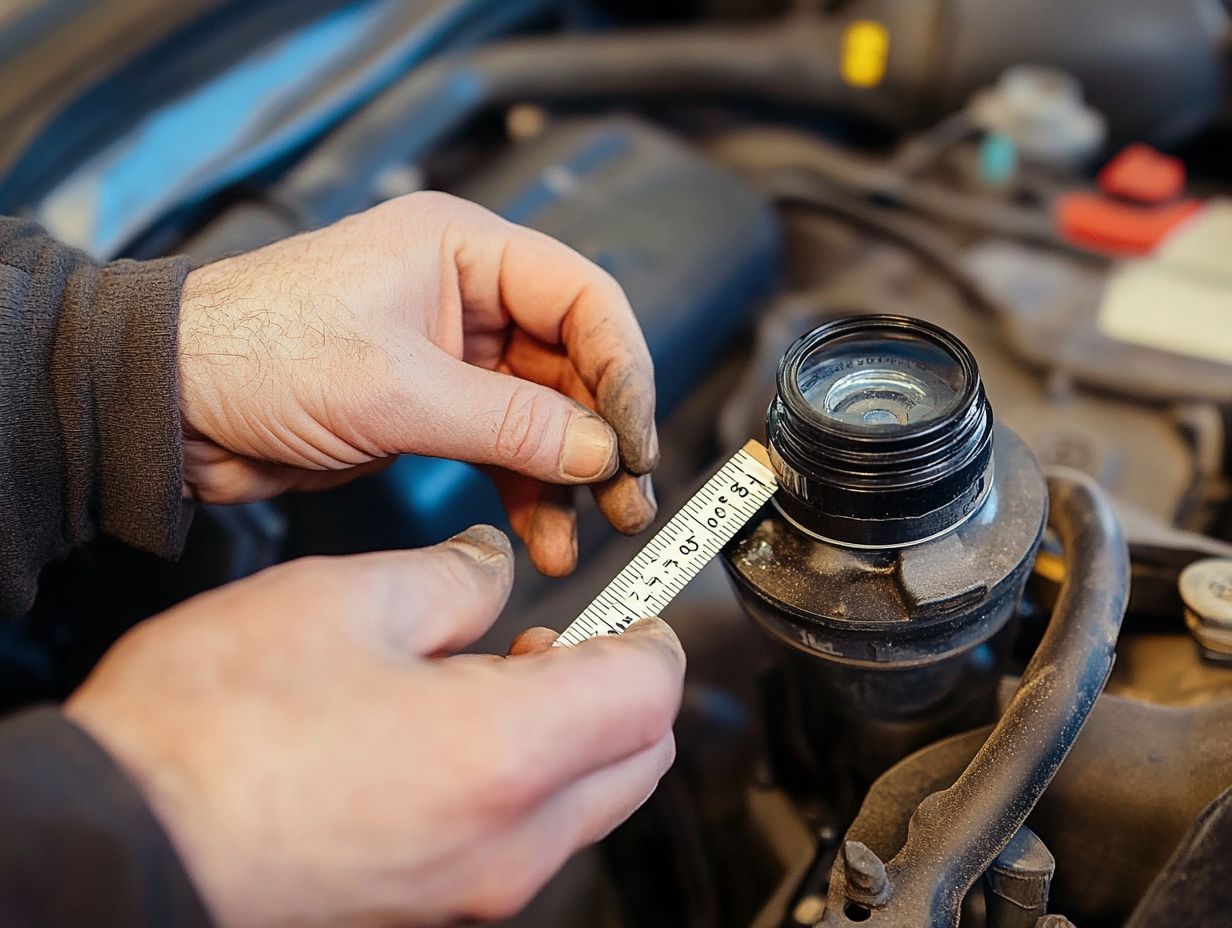
When changing brake fluid, using the right techniques and recommended products is crucial for safety and performance. This attention to detail helps your vehicle operate at its best.
Always consult the manufacturer s specifications. These guidelines reveal the specific type of brake fluid compatible with your vehicle’s braking system.
Opting for high-quality products not only boosts performance but also prolongs the lifespan of your braking components. Selecting the correct brake fluid whether it s DOT 3, DOT 4, or DOT 5.1 can significantly enhance your driving experience.
Tips for Maintaining Optimal Brake Fluid Levels
To maintain optimal brake fluid levels and ensure the efficiency of your brake system, it is crucial to adhere to specific maintenance tips that enhance both safety and performance.
Regular Maintenance Steps
Implementing regular maintenance steps can elevate your brake system’s performance and extend the lifespan of your brake components.
By regularly testing your brake fluid and conducting thorough inspections, you can identify potential issues before they escalate. This ultimately ensures a safer driving experience.
These strategies enhance the reliability of your braking system and minimize the chances of costly repairs in the future.
Staying vigilant with your maintenance schedules fosters a deeper understanding of your vehicle s condition. This enables timely interventions that effectively mitigate wear and tear.
This proactive approach safeguards you and your passengers while guaranteeing optimal performance during critical moments on the road.
Frequently Asked Questions
What is brake fluid and why is it important to inspect its levels?
Brake fluid is a vital component of your car’s braking system, responsible for transferring the force of your foot on the brake pedal to the actual brakes. Make it a habit to check your brake fluid levels regularly to stay safe on the road!
How often should I check my brake fluid levels?
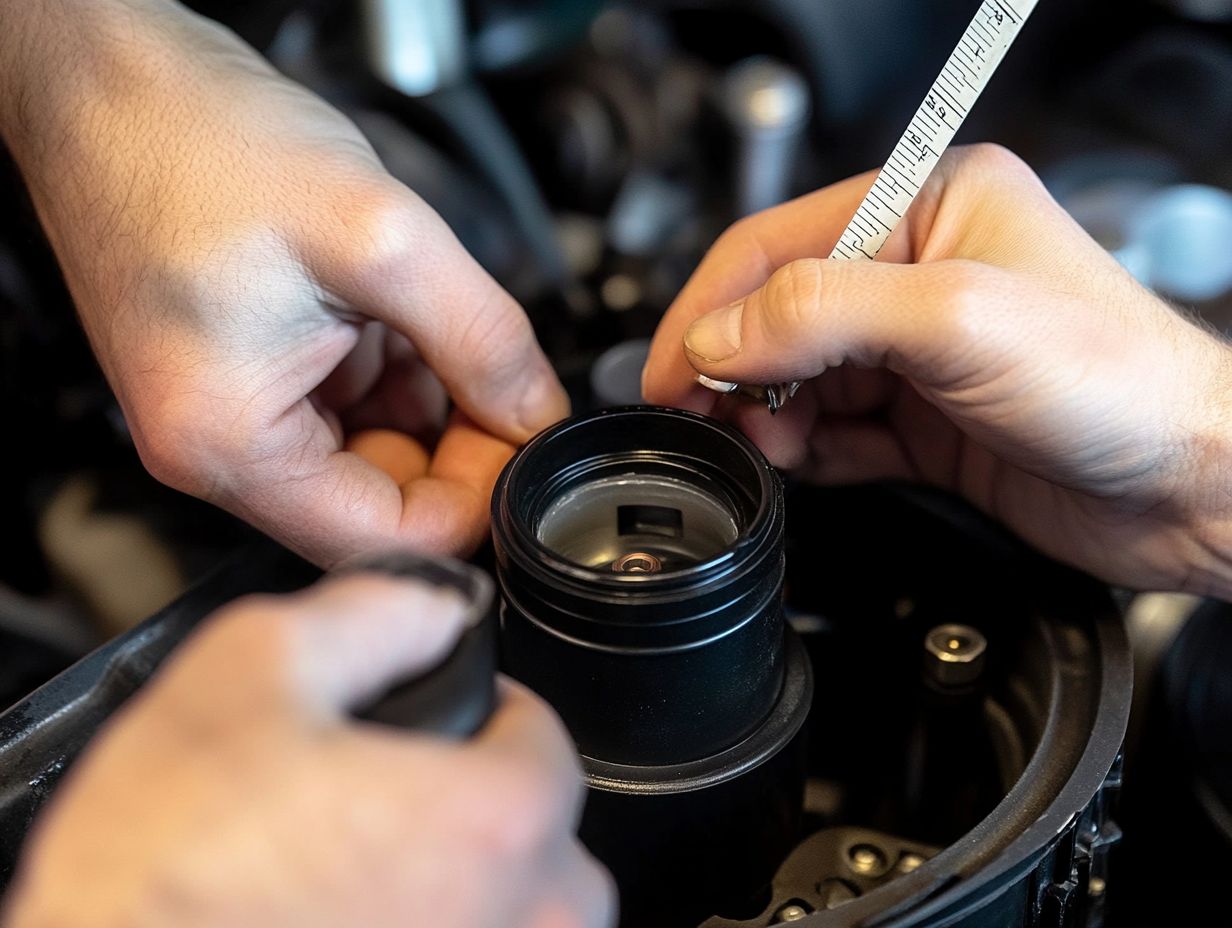
It is recommended to check your brake fluid levels at least once a month. However, if you notice any changes in your braking performance, such as a spongy pedal or longer stopping distance, inspect the levels immediately.
What do I need to inspect my brake fluid levels?
All you need is a clean cloth and a flashlight. It is also helpful to have a reference guide or manual specific to your car model to determine the location of the brake fluid reservoir.
How do I check my brake fluid levels?
First, locate the brake fluid reservoir. It is usually a small plastic container near the back of the engine compartment. Use the flashlight to check the fluid level against the “Full” and “Minimum” marks on the side of the reservoir.
If the level is closer to the “Minimum” mark, it is time to add more fluid.
What type of brake fluid should I use?
It is important to use the type of brake fluid recommended by your car manufacturer. This information can usually be found in your car’s owner’s manual or on the cap of the brake fluid reservoir.
Using the wrong type of fluid can cause damage to your braking system.
Can I add brake fluid myself or do I need to take my car to a mechanic?
Adding brake fluid is a simple task that can be done by most car owners. However, if you’re unsure about the process, it is best to consult a mechanic immediately to avoid any risks. Improperly adding brake fluid can lead to potential damage to your car’s braking system.




